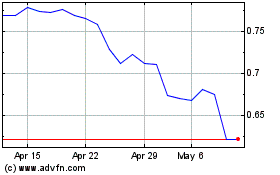Italy Raises $3.8 Billion From Poste IPO
October 23 2015 - 7:40AM
Dow Jones News
MILAN—The Italian government completed the sale on Friday of a
minority stake in postal service Poste Italiane, the largest of a
string of privatizations Prime Minister Matteo Renzi is pressing
ahead with and a major test of his ability to convince foreign
investors Italy is on the road to recovery.
The offer, the first large sale of shares in government-owned
companies in 16 years, generated around €3.4 billion ($3.8 billion)
in much-needed cash for the government and was priced at €6.75 per
share—at the mid-point of the price range initially indicated,
valuing the business at roughly €8.8 billion.
"It was a great success," said Italy's Economy Minister Pier
Carlo Padoan. "It confirms the markets' confidence in our
country."
The sale of Poste was seen as a test case for Mr. Renzi's
government efforts to privatize state behemoths as it tries to
reduce the country's public debt, the second-largest of the euro
zone after Greece. The positive result of the sale could
reinvigorate these efforts, after the flop of shipmaker Fincantieri
SpA's initial public offering, where the shares offered were cut by
a third and priced at the bottom of its price range in June 2014.
That deal started the Renzi government's privatization effort off
on the wrong foot.
One of the main reasons behind the Fincantieri's problematic
sale, according to brokers, was the decision not to pay dividends
for the first three years. The government said at the time that
difficult market conditions undermined the outcome.
After Poste, the government plans to list a 49% stake in
air-traffic-control operator ENAV SpA in the first half of next
year and to partially privatize state railways Ferrovie dello Stato
Italiane Group. It said it is also considering selling a stake in
highway maintenance agency Anas in the future.
The planned transactions will help reduce the country's debt,
seen this year at 132.8% of gross domestic product, by 0.4% of the
country's GDP this year and 0.5% each of the following three years,
the government said in its budget law it approved last week. For
this year, it said the target appears to be within reach.
Privatizations are one of the main points of Mr. Renzi's
reformist agenda. The timing of the Poste IPO is also relatively
good, with the Italian economy expected to grow 0.9% this year,
exiting a three-year long recession—the longest since World War
II.
Yet, the recovery is too timid to shake off decades of
stagnation and Mr. Renzi still needs to prove to investors and
policymakers that he can reinvigorate the Italian economy.
The outcome of the â,¬12 billion privatization plan—which Mr.
Renzi inherited from the previous government—has been disappointing
so far. Last May, the International Monetary Fund warned Rome that
its progress in reducing debt remains insufficient and urged it to
take advantage of favorable market conditions to be more ambitious
in its privatization targets.
Despite only reducing slightly Italy's debt, the Poste's IPO
represents what Mr. Renzi's called "a change of direction" in his
push for the modernization of the country. The young prime minister
hopes it could help show that, thanks to his broad economic
overhauls, Italy is able to attract foreign capital again.
The government promised a hefty dividend payout for the next two
years to entice investors at a time of low interest rates. This
corresponds to around a 5% yield at the pricing of the IPO,
compared with 2% to 3% for large Italian banks and 0.2% for
two-year government bonds, making the investment quite appealing,
said Giacomo Tilotta, fund manager at AcomeA SGR.
Now, the government is facing a decision as to whether to list
the whole Ferrovie Group--which includes the railway network, a
train operating business and a vast real estate business made up by
the stations—or only part of it, but keeping control of the railway
grid.
Advocates for listing a stake in the entire holding company,
such as Ferrovie's Chief Executive Michele Elia, argue the company
now benefits from cross-synergies among the various businesses.
For instance, the train operating business can currently borrow
more easily because it can guarantee its debts with the vast
amounts of assets the holding owns, such as the railway grid, said
Paolo Beria, a professor in Transport economics at Milan's
Polytechnic.
Others, such as Transport Minister Graziano Delrio, say it would
be preferable to spin off the railway grid and maintain it into
public hands, as it represents a public good.
"There's an ongoing discussion within the government and with
the interested parties," said Fabrizio Pagani, head of the office
of the Economy Ministry.
Subscribe to WSJ: http://online.wsj.com?mod=djnwires
(END) Dow Jones Newswires
October 23, 2015 07:25 ET (11:25 GMT)
Copyright (c) 2015 Dow Jones & Company, Inc.
Fincantieri (BIT:FCT)
Historical Stock Chart
From Mar 2024 to Apr 2024

Fincantieri (BIT:FCT)
Historical Stock Chart
From Apr 2023 to Apr 2024
